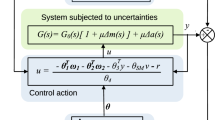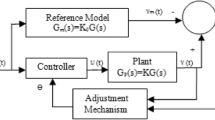Abstract
In this paper, a quasi-Newton-type optimized iterative learning control (ILC) algorithm is investigated for a class of discrete linear time-invariant systems. The proposed learning algorithm is to update the learning gain matrix by a quasi-Newton-type matrix instead of the inversion of the plant. By means of the mathematical inductive method, the monotone convergence of the proposed algorithm is analyzed, which shows that the tracking error monotonously converges to zero after a finite number of iterations. Compared with the existing optimized ILC algorithms, due to the superlinear convergence of quasi-Newton method, the proposed learning law operates with a faster convergent rate and is robust to the ill-condition of the system model, and thus owns a wide range of applications. Numerical simulations demonstrate the validity and effectiveness.
Similar content being viewed by others
References
S. Arimoto, S. Kawamura, F. Miyazaki. Bettering operation of robots by learning. Journal of Robotic Systems, 1984, 1(2): 123–140.
N. Amann, D. H. Owens, E. Rogers. Iterative learning control for discrete-time systems with exponential rate of convergence. IEE Proceedings–Control Theory and Applications, 1996, 143(2): 217–224.
J. Xu. Analysis of iterative learning control for a class of nonlinear discrete-time systems. Automatica, 1997, 33(10): 1905–1907.
J. H. Lee, K. S. Lee, W. C. Kim. Model-based iterative learning control with quadratic criterion for time-varying linear systems. Automatica, 2000, 36(5): 641–657.
D. Meng, Y. Jia, J. Du, et al. Feedback iterative learning control for time-delay systems based on 2D analysis approach. Journal of Control Theory and Applications, 2010, 8(4): 457–463.
X. Ruan, Z. Li. Convergence characteristics of PD-type iterative learning control in discrete frequency domain. Journal of Process Control, 2014, 24(12): 86–94.
X. Ruan, Z. Z. Bien, Q. Wang. Convergence characteristics of proportional-type iterative learning control in the sense of Lebesgue-ρ norm. IET Control Theory and Applications, 2012, 6(5): 707–714.
S. S. Saab. A discrete-time stochastic learning control algorithm. IEEE Transactions on Automatic and Control, 2001, 46(6): 877–887.
C. Yin, J. Xu, Z. Hou. A high-order internal model based iterative learning control scheme for nonlinear systems with timeiteration- varying parameters. IEEE Transactions on Automatic Control, 2010, 55(11): 2665–2670.
A. Tayebi, M. B. Zaremba. Robust iterative learning control design is straightforward for uncertain LTI systems satisfying the robust performance condition. IEEE Transactions on Automatic Control, 2003, 48(1): 101–106.
T. Liu, X. Wang, J. Chen. Robust PID based indirect-type iterative learning control for batch processes with time-varying uncertainties. Journal of Process Control, 2014, 24(12): 95–106.
H. S. Ahn, K. L. Moore, Y. Chen. Stability analysis of discretetime iterative learning control systems with interval uncertainty. Automatica, 2007, 43(5): 892–902.
Y. Chen, C. Wen, Z. Gong, et al. An iterative learning controller with initial state learning. IEEE Transactions on Automatic Control, 1999, 44(2): 371–376.
J. H. Lee, K. S. Lee, W. C. Kim. Model-based iterative learning control with a quadratic criterion control with a quadratic criterion for time-varying linear systems. Automatica, 2000, 36(5): 641–657.
D. H. Owens, K. Feng. Parameter optimization in iterative learning control. International Journal of Control, 2003, 76(11): 1059–1069.
D. H. Owens, J. Hätönen, S. Daley. Robust monotone gradientbased discrete-time iterative learning control, time and frequency domain conditions. International Journal of Robust Nonlinear Control, 2009, 19(6): 634–661.
T. J. Harte, J. Hätönen, D. H. Owens. Discrete-time inverse model-based iterative learning control, stability, monotonicity and robustness. International Journal of Control, 2006, 78(8): 577–586.
D. H. Owens, B. Chu, M. Songjun. Parameter-optimal iterative learning control using polynomial representations of the inverse plant. International Journal of Control, 2012, 85(5): 533–544.
X. Yang, X. Ruan. Conjugate direction method of iterative learning control for linear discrete time-invariant systems. Dynamics of Continuous, Discrete and Impulsive Systems–Series B: Applications & Algorithms, 2013, 20(5): 543–554.
M. Norrlöf. An adaptive iterative learning control algorithm with experiments on an industrial robot. IEEE Transactions on Robotics and Automation, 2002, 18(2): 245–251.
W. Li, P. Maisse, H. Enge. Self-learning control applied to vibration control of a rotating spindle by piezopusher bearings. Proceedings of the Institution of Mechanical Engineers–Part I: Journal of Systems and Control Engineering, 2004, 218(13): 185–196.
K. S. Lee, J. H. Lee. Convergence of constrained model-based predictive control for batch processes. IEEE Transactions on Automatic Control, 2000, 45(10): 1928–1932.
H. S. Ahn, Y. Chen, K. L. Moore. Iterative learning control: brief survey and categorization. IEEE Transactions on Systems, Man, and Cybernetics–Part C: Applications and Reviews, 2007, 37(6): 1099–1121.
P. Hennig, M. Kiefel. Quasi-Newton methods: a new direction. Proceedings of the 29th International Conference on Machine Learning, Edinburgh, Scotland, 2012: http://icml.cc/2012/papers/25.pdf.
L. Dumas, V. Herbert, F. Muyl. Comparison of global optimization methods for drag reduction in the automotive industry. International Conference on Computational Science and Its Applications, Berlin: Springer, 2005: 948–957.
Y. S. Ong, P. B. Nair, A. J. Keane. Evolutionary optimization of computationally expensive problems via surrogate modeling. AIAA Journal, 2003, 41(4): 687–696.
Y. Yuan, W. Sun. Theory and Methods of Optimization. Beijing: Science Press, 1997.
J. Nocedal, S. J. Wright. Numerical Optimization. New York: Springer, 2006.
Y. Fang, T. W. S. Chow. Iterative learning control of linear discretetime multivariable systems. Automatica, 1998, 34(11): 1459–1462.
A. Madady. PID type iterative learning control with optimal gains. International Journal of Control Automation and Systems, 2008, 6(2): 194–203.
Author information
Authors and Affiliations
Corresponding author
Additional information
This work was supported by the National Natural Science Foundation of China (Nos. F010114-60974140, 61273135).
Yan GENG received the B.Sc. degree in Mathematics from Changzhi University, China in 2009. She received the M.Sc. degree in Mathematics from Hebei University, China, in 2012. Currently, she is a Ph.D. candidate of Xi’an Jiaotong University, China. Her research interests are iterative learning control and optimization.
Xiaoe RUAN received the B.Sc. and M.Sc. degrees in Pure Mathematics Education from Shaanxi Normal University, China, in 1988 and 1995, respectively. She received the Ph.D. degree in Control Science and Engineering from Xi’an Jiaotong University, China, in 2002. From March 2003 to August 2004, she worked as a postdoctoral fellow at the Department of Electrical Engineering, Korea Advance Institute of Science and Technology, Korea. From September 2009 to August 2010, she worked as a visiting scholar at Ulsan National Institute of Science and Technology, Korea. Since 1995, she joined in Xi’an Jiaotong University. Currently, she is a full professor in School of Mathematics and Statistics. She has published more than 40 academic papers. Her research interests include iterative learning control and optimized control for large-scale systems.
Rights and permissions
About this article
Cite this article
Geng, Y., Ruan, X. Quasi-Newton-type optimized iterative learning control for discrete linear time invariant systems. Control Theory Technol. 13, 256–265 (2015). https://doi.org/10.1007/s11768-015-4161-z
Received:
Revised:
Accepted:
Published:
Issue Date:
DOI: https://doi.org/10.1007/s11768-015-4161-z




